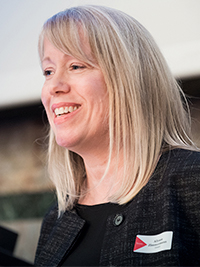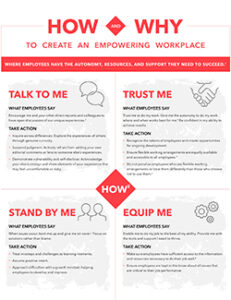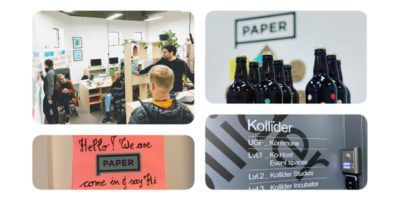Allyson Zimmermann is EMEA executive director at Catalyst, where she works with leading global organisations, developing and supporting Catalyst members in advancing their diversity and inclusion initiatives to make positive change for women in the workplace. As a citizen of the US and Switzerland, she currently resides in Zurich, previously having lived and worked in four other countries. Outside of her role at Catalyst, Allyson is a professional coach.

“The pandemic has demonstrated that office-centric work no longer needs to be the default. As we learn to adapt post-COVID, there is a unique opportunity for organisations to move beyond this inflexible model of office-based working and to reward team members for productivity and not presenteeism.”
Progress for women is progress for everyone
I’m the executive director of Catalyst‘s operations in Europe, the Middle East and Africa (EMEA), and I help Catalyst Supporters to create more inclusive workplaces so all talent, particularly women, can advance. We know that progress for women is progress for everyone.
I grew up in the United States but moved to Europe at the age of 22 after I received my BA in German and communications from the University of Minnesota. I’ve been lucky to live across four countries in Europe, and as a dual national (Swiss and American), my home is in Zurich. I’m also a professional coach.
Don’t change the women, remove their barriers to advancement
Catalyst is one of the first global non-profit organisations to focus on helping to build workplaces that work for women. Our work is rooted in rigorous global research, which provides critical insight into issues affecting women in the workplace.
We question on a daily basis why women, and particularly women of colour, are not equally represented at the top of the corporate ladder. We believe, and our research shows, that it is not women who need to be changed, but that barriers preventing women’s advancement into senior roles need to be removed.
We help organisations diagnose these barriers and help build inclusive cultures, assisting organisations to reduce unconscious bias and ensure women advance at every stage in their careers, including building a diverse board.
Same storm, different boat
The pandemic has been devastating for many, but particularly for women with caregiving responsibilities. Catalyst research found that women are twice as likely as men to be primarily responsible for home-schooling their children. 41% of mothers and 36% of fathers say they have had to hide their caregiving struggles at work. This has created enormous stresses and strains on people.
Women of colour have also been disproportionately affected by the crisis, suffering heavy job losses, as well as being more likely to be essential workers, often earning lower wages and facing health risks to themselves and their families.
In addition to bearing the brunt of social inequities, women of colour are also paid less than white women in the workplace and face an additional burden, an Emotional Tax.

A Catalyst survey found that 62% of women employees feared that COVID-19 had negatively impacted their prospects for promotion, compared to 57% of men.
COVID-19 has forced us all to think more about people’s personal circumstances and what they need in order to work effectively. Everyone has their own unique circumstances. Creating a workplace that reflects and values this is crucial in supporting the whole workplace. Empathy and curiosity have become more important than ever.
People are now more vocal, and that’s good
Since the last time we spoke, the diversity and inclusion landscape has changed in many ways, one of the most visible is how much attention it is getting. However, this does not mean that everyone is on board or that the work is being done.
With so much attention, there is often the perception that people are being included, and indirectly, is the fear that now there is favouritism or preferential treatment, especially around gender. However, men are still getting the overwhelming majority of opportunities to advance, but still, there’s a fear they will be left out as if there is some proverbial pie out there with static slices.
This is not new, we heard this over the past decade, but it feels as if people are more forthcoming with this fear. I do think it’s a good sign that people are more forthcoming with this fear, no matter how faulty.
What worries me more is when I see nodding heads and hear: “Oh, I’m for this or that” and then they go back to what worked for them before and change doesn’t happen.
I would much rather have the conversations we are having now, no matter how intense, where we can pull up and out some of the beliefs, like weeds, about why progress is not happening at a quicker pace.
When we are having these discussions, and we learn something we did not know before, then we may be more open to creating change. At the very least we will be questioning some commonly held perceptions that are simply not true.
The future of work
Understandably, leaders are apprehensive and uncertain about whether hybrid work will be a good thing in the long run. Catalyst has a dedicated division focused on the Future of Work and we’d like to dispel some of the common myths around hybrid work and make the argument that when flexible and remote work is intentionally designed, it’s much better for companies, employees, and for inclusion.
We know that a staggering 92% of global workers have reported burnout, according to our most recent report. However, working remotely during a pandemic is different from remote work in general.
Many organisations were forced to move quickly to remote work without thinking through it intentionally, replicating many of their in-person processes, procedures, and practices in a virtual environment. This often led to a higher number of meetings, many using video, and an expectation of immediate responses to chats.
The report also found that:
- Burnout drops 26% with remote-work options;
- Burnout drops 43% with empathetic managers;
- Employers with remote-work access are 30% less likely to look for another job.
Remote work must be inclusive and flexible for sustained long term success. Managers demonstrating empathy and organisations offering remote work access is a powerful combination for worker well-being and business benefits.
There will not be a one-size-fits-all model that works for every company — some will allow for both geographic and schedule flexibility, others will likely allow one over the other.
Learning from the changes COVID-19 brought us
The pandemic has demonstrated that office-centric work no longer needs to be the default. As we learn to adapt post-COVID, there is a unique opportunity for organisations to move beyond this inflexible model of office-based working and to reward team members for productivity and not presenteeism. Some team members, of course, will be delighted to return to the office, away from their domestic sphere, while others will prefer to work remotely. Inclusive employers will allow this to be a choice, not a diktat.

Taking an intersectional approach to diversity and inclusion
People are a combination of their gender, race, nationality, age, ability and sexual orientation, and it is the combination of these that informs their perspectives and experiences. Employers need to rise to the challenge of understanding the unique issues faced by employees who reflect more than one dimension of diversity, particularly for women of colour.
If you are ‘self-policing’ your actions all day and worried about how you are seen, you are far less likely to speak up in meetings, for instance, and will feel inhibited in your everyday interactions in the workspace – and this can have far-reaching effects. For employees to thrive within their workplace, they must feel psychologically safe or comfortable bringing their full authentic self without fear of being mistreated or penalised for making mistakes.
Still much to do
As well as continuing our deep dive into inclusive leadership behaviours, we are looking at the future of work and hybrid and remote work; the power of non-performative allyship, intersectionality and particularly the barriers for women of colour.
We’ve also been focusing on how men can become gender equity partners in the workplace. Our new reports on Interrupting Sexism in the workplace find that men are affected by deeply held societal norms of what a ‘real man’ is and this can affect their willingness to stop sexist behaviour in the workplace. Worryingly, managers are the least likely to act to stop sexism.
There is still much to do. Working to advance women in the workplace has put me in a pivotal position to make positive change, which gives me enormous satisfaction every day.
It’s essential that we drive change to create inclusive workplaces, where all talent can thrive. I believe that a good leader is an inclusive leader, who leads with altruistic behaviours (such as humility, empathy and courage). This is key to building trust and engagement and has never been more important than at this time of crisis.
https://www.linkedin.com/in/allyson-zimmermann-5450b61a/
https://twitter.com/allyzimmermann





